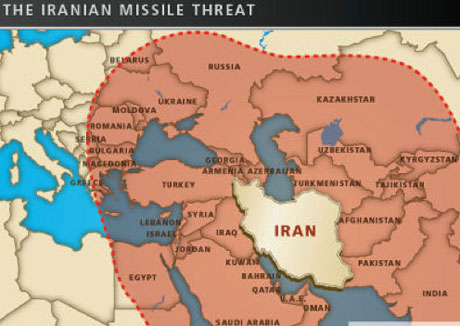Report Questions Conventional Wisdom About Iranian Regime
An Iranian soldier stands guard as other troops in camouflage march during an Army Day ceremony outside Tehran. (By Hasan Sarbakhshian -- Associated Press)
By Walter Pincus
Tuesday, May 26, 2009
"Tehran feels vulnerable, both from outside and from within."
That is just one of a handful of intriguing findings in a study released by the Rand Corp. last week that challenges conventional American thinking about the Iranian regime.
The U.S. Air Force Directorate of Operational Plans and Joint Matters sponsored the study, given Iran's apparent drive to develop nuclear weapons and the likelihood that the United States would use air power as a "first resort" military response to meet that threat.
Faced with that situation, the report's authors decided to take a fresh look at what could be expected from Iran over the next decade, measured against not only the country's military and economic strengths and religious influence but also its "serious liabilities and limitations."
U.S. policies over the past nine years eliminated the most serious threat to Iran, Saddam Hussein's regime in Iraq, and an American-led coalition has been fighting against the Taliban, another potential enemy of Iran. Still, there remains "a myriad of threats and vulnerabilities that challenge Iran in the current strategic environment," according to the Rand report.
"We found significant barriers and buffers to Iran's strategic reach rooted in both the regional geo-politics it is trying to influence and in its limited conventional military capacity, diplomatic isolation, and past strategic missteps," the report says.
The study calls attention to sectarian violence and Sunni-inspired terrorism in two key Iranian provinces, Khuzestan and Baluchistan, where opposition exists against the Shiite regime in Tehran. In addition, the report says that Tehran's religious hierarchy is worried about theological and political challenges emerging from Shiite seminaries in Iraq.
"The Shiite learning centers of Najaf and Karbala [in Iraq] long dominated Shiite discourse before being suppressed by Baathist regimes," according to the study. They are reemerging and have the potential to overshadow their Iranian counterparts in Qom, the seat of Shiite scholarship. The study notes that many Shiites in Saudi Arabia and Bahrain, for example, "look to the seminaries in Najaf, particularly Grand Ayatollah Ali al-Sistani, instead of the Iranian Supreme Leader [Ayatollah Ali Khamenei] for spiritual and political guidance."
And although Iran has supported Shiite militant groups in Iraq, the report says, "Iranian funds and military assistance are not essential to the survival of major Shiite political factions." Instead, some of the groups receiving aid from Tehran are "promoting an image of Iraqi nationalism for domestic support and thus prefer to maintain a degree of separation from Tehran."
Iran has long provided financial and military aid to Islamist groups such as Hamas in the Palestinian territories and Hezbollah in Lebanon. The study, however, raises doubts that in the event of a U.S. attack against Iran, "the willingness of these groups to retaliate purely in the service of Tehran should not be assumed as automatic." The report's authors conclude that "it is best to conceive of Iran as exerting influence over its Shiite allies, but not control."
The study also questions conventional wisdom about Iran's military capabilities. Iranian leaders have created a multilayered military, in part because of a relatively weak army "mired down in conventional doctrine because of bureaucratic inertia in procurement and frequent infighting." Its equipment is aging and poorly maintained.
Iran's overlapping security structure "is beset with factionalism," according to the study. Decision making requires consensus among competing groups that consist of the office and associates of Khamenei, President Mahmoud Ahmadinejad, the military and intelligence communities, and finally the Revolutionary Guard Corps.
The Revolutionary Guard provides much of the support to Hamas, Hezbollah and other militant groups outside Iran. It also has major missile weaponry and a network of businesses, making it a player in foreign policy and domestic politics.
But there is frequent squabbling between the Revolutionary Guard and conventional forces, according to the study. Beyond these groups are the bonyads, charitable trusts that control almost 40 percent of Iran's wealth and support Khamenei and the Revolutionary Guard; the bazaari business community; and the religious sector. The factionalism of this system leads to inconsistencies in the approach toward the United States but at the same time makes it difficult for Iran to change course rapidly, the study says.
Despite Iran's rhetoric, the study concludes that Tehran does not seek to enlarge its territory or force its brand of Islamic revolution on its neighbors. Instead, the report cautions that "the ideology and bravado of Iran's President Ahmadinejad and its religious leader Ayatollah Khamenei mask a preference for opportunism and realpolitik -- the qualities that define 'normal' state behavior."
Report Takes Fresh Look at Iranian Regime, Challenges U.S. Assumptions - washingtonpost.com







 19-May-2009, New York, NY -
19-May-2009, New York, NY - 

 A map contained in a brochure distributed at an Aipac meeting
A map contained in a brochure distributed at an Aipac meeting